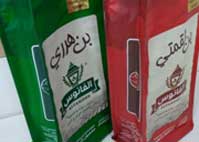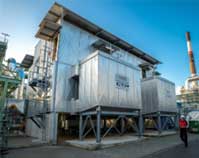Plants: UFlex expands packaging films capacity in India; Lanxess inaugurates nitrous oxide reduction plant in Antwerp

UFlex Ltd, India’s largest multinational flexible packaging company, has scored in the packaging sector since it has become a lifeline in the battle against Covid-19 pandemic. The company witnessed a surge in demand for multiple lines of businesses while also adding newer clients. With this, UFlex also announced domestic and international expansion for its packaging films business in the results. Speaking of the capacity expansion, Rajesh Bhatia, Group CFO at UFlex Limited said, “The highlights of this quarter are commissioning of the brownfield BOPET film line in Poland with a capacity of 45,000 tonnes/year. The trial run for our BOPP plant in Hungary and BOPET plant in Nigeria have already commenced and both the plants are expected to be commissioned soon. In India, we have not expanded the capacity of packaging films since the last 16 years and are now setting up greenfield BOPET and CPP lines in Karnataka to meet the growing demand. We are also expanding outside India with plans to set up brownfield CPP film line at our UAE plant that will add a production capacity of 18,000 tonnes/year.”
Ashok Chaturvedi, Chairman & Managing Director, UFlex Limited said, “UFlex has played a pivotal role in providing packaged products to the end consumers during the pandemic. In line with our vision to go glocal and serve the last mile with our best-in-class innovative and sustainable solutions, we are scaling up our international as well as domestic operations. Driven by a robust order book and consistent market growth, we are doubling the manufacturing capacity of our Aseptic Liquid Packaging plant in Sanand.”
The earlier capacity of the group’s packaging films plant in Poland was 30,000 tonnes/year and with an additional 10.4 m wide BOPET line of 45,000-tonne/year getting commissioned, FlexFilms is the largest BOPET manufacturer in European Union. In India, the current capacity of packaging films line with BOPET, BOPP, CPP put together is 92,000 tonnes/year. The new lines to be added in South India will have a cumulative production capacity of 63,000 tonnes/year. The UAE plant that currently houses a BOPET line with capacity of 22,000 tonnes/year, will have an additional capacity of 18,000 tones/year once the CPP line is commissioned.
UFlex today has packaging facilities at multiple locations in India with installed capacity of around 1.3 million tonnes/year and has packaging film manufacturing facilities in India, UAE, Mexico Egypt, Poland, Russia, and USA with a cumulative capacity of 3.8 million tonnes/year.

In other news, German chemical firm Lanxess has inaugurated its EUR10 million nitrous oxide reduction plant at its site in Antwerp, Belgium. The plant breaks down around 500 tonnes/year of nitrous oxide, which is equivalent to the climate impact of 150,000 tonnes of CO2. A second plant is scheduled to start up in 2023 and is expected to eliminate a further 300,000 tonnes of CO2 equivalents (CO2e). In 2019, Lanxess announced to invest a total of up to EUR100 million in its climate protection projects by 2025.
“We are committed to the Paris Agreement to limit global warming to less than two degrees Celsius. The new nitrous oxide reduction plant in Antwerp is a key building block in Lanxess becoming climate-neutral by 2040,” explained Lanxess Board of Management member Hubert Fink. At the same time, he highlighted the economic benefits of the climate protection measures, saying that “Climate protection is a business case for us. On the one hand, we are becoming an even more sustainable partner for our customers. On the other, we are reducing our costs because we need fewer certificates from the European Emissions Trading System and use less energy thanks to innovative technologies.”
Nitrous oxide (N2O), also known as laughing gas, is generated at the Antwerp site during the production of the plastic intermediate caprolactam. It is harmless to humans but 300 times more harmful to the environment than carbon dioxide. At temperatures of around 1,000 degrees Celsius, Lanxess breaks down the nitrous oxide into its harmless components nitrogen and oxygen in the new plant, thus neutralizing it completely.
In a second process step, the plant breaks down further nitrogen oxides (NOx). Ammonia is used as a reducing agent for this. At temperatures between 250 and 450 degrees Celsius, the nitrogen oxides are broken down and produce nitrogen and water.
Thanks to the innovative combination of these processes the plant is highly thermally efficient. This is ensured by specially developed ceramic heat exchangers. These capture and store the heat used in the thermal oxidation process and generated during the breakdown of nitrous oxide and nitrogen oxides. When the heat exchangers have stored the heat from the clean gas, the process flow changes direction and the heat exchangers now preheat the incoming exhaust gas. This change of direction then takes place recurrently. This means that significantly less external energy has to be supplied to keep the process running.
In addition to the Antwerp plant, the Group is currently implementing further climate protection projects with the aim of becoming climate neutral by 2040. Lanxess is also switching the entire energy supply at its Indian sites to renewable energy sources. There, the company is massively expanding its supply of biomass and solar power and will no longer use coal or gas in the future. This will cut CO2e emissions by a further 150,000 tonnes starting from 2024. The Group also plans to phase out coal-based energy use at its major production sites in Germany.
Since Lanxess was founded in 2004, the Group has more than halved its emissions from 6.4 million tonnes of CO2e to around 3.06 million tonnes of CO2e in 2019.
Lanxess has two production sites in the Antwerp port area. They are at the heart of the global high-performance plastics business. The intermediates caprolactam and polyamide are produced in Lillo/Antwerp. In Kallo/Antwerp, LANXESS produces glass fibres, also for use in plastics, and rubber chemicals. In total, it employs around 1,000 people in Belgium.
(PRA)
Subscribe to Get the Latest Updates from PRA Please click here
©2021 Plastics and Rubber Asia. All rights reserved.

©2020 Plastics and Rubber Asia. All rights reserved.
Home Terms & Conditions Privacy Policy Webmail Site Map About Us














